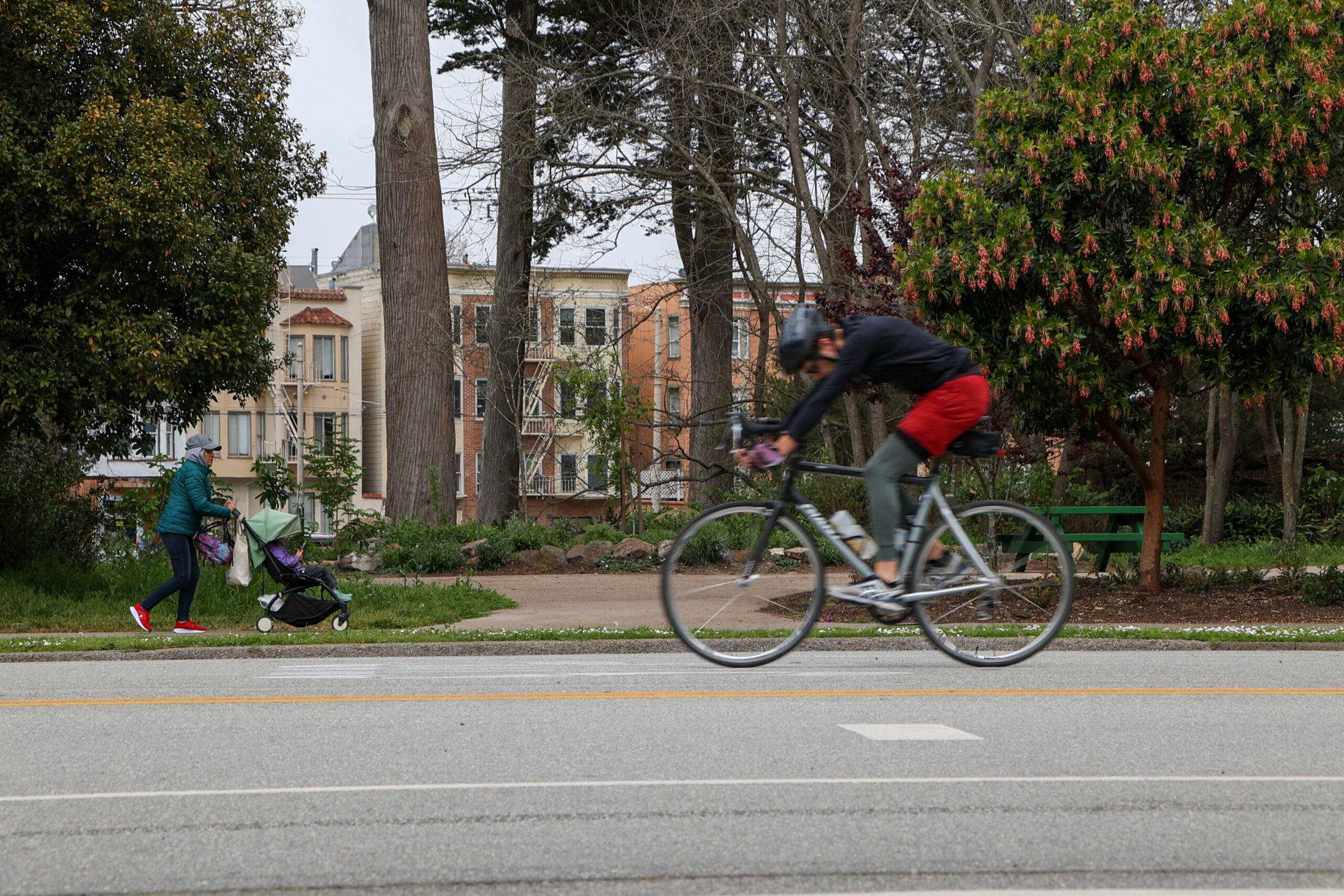One of the fiercest and most expensive debates to occur in San Francisco during the pandemic—whether to keep John F. Kennedy Drive closed to cars—will likely be decided by voters this fall after a ballot measure proposal was submitted last week to the city’s Department of Elections.
The “Access for All Ordinance,” which was submitted on June 6 and is supported by the de Young Museum, seeks to restore car access to pre-pandemic levels on JFK Drive, as well as the Great Highway, Martin Luther King, Jr., Drive and Bernice Rogers Way. JFK Drive would still have temporary closures on weekends, holidays and special events.
“The full and permanent closure of JFK Drive places a disproportionate burden on people with disabilities, seniors, families and those who live far from the Park,” the proposed ordinance states. “It is time to return to earlier agreements to allow for all to equitably access and use the Park.”
In April, the Board of Supervisors held a 12-hour meeting before voting to keep cars off JFK Drive permanently. Mayor London Breed led on the ordinance, which passed by a 7-4 vote with supervisors Connie Chan, Aaron Peskin, Shamann Walton and Ahsha Safaí opposed.
Chan, whose district includes JFK Drive, had a competing proposal to reopen the roadway, but that idea was shot down. In a text to the Standard, Chan’s office said the supervisor had no role in the current ballot measure proposal, which was first reported by the Examiner.
In order to make it on the ballot in November, organizers behind the ordinance will need to submit 8,979 valid signatures from registered San Francisco voters by July 11, according to the Department of Elections. The total number of signatures required is set by the City Charter and represents just 5% of the total votes cast in the previous mayoral election from 2019.
By comparison, the recent recall of District Attorney Chesa Boudin required more than 50,000 signatures to be gathered because the recall of an elected official is based on a threshold of 10% of registered voters in the city.
On June 6, Richard Corriea and Howard Chabner filed paperwork for the proposed ballot measure. Neither was available for comment. While the July 11 deadline for signatures is tight, the relatively low number of signatures required should make qualifying for the November ballot possible.
Also included in the ballot measure is a call to keep the Great Highway Extension, the southern portion of the road between Sloat and Skyline Boulevards, open to cars indefinitely. This particular stretch of road has faced erosion issues and is scheduled to close permanently in 2023 as part of the Ocean Beach Climate Adaptation Project, aimed at protecting Westside Pump Station and Oceanside Treatment Plant. That project is currently in the design and environmental review phase.
There is a provision in the proposed ballot measure that would allow the Great Highway to close for repairs, such as to rebuild the southern part of the road, said Jen Kwart, communications director for the City Attorney’s office. Now that it’s been submitted to the Department of Elections, the text of the ballot measure almost certainly wouldn’t change, Kwart said, leaving the proposed ballot measure in opposition to current city plans.
Matthew Selby, a division manager with the Department of Elections, said the office of City Attorney David Chiu is reviewing the documents and drafting a title and summary for the potential ballot measure. The city attorney has 15 calendar days to issue a title and summary, which means it would be due no later than June 21.
“I would expect it probably later this week, but if not early next week,” Selby said.
If the proposed ordinance succeeds in getting on the ballot, the battle between “Access for All” and its sponsors and proponents of car-free streets will be intense—and expensive. While a city-run survey found around 75% of San Franciscans supported the closure of JFK Drive to cars, in The Standard’s voter poll, which surveyed registered voters online, just 35% of voters said they support closing select streets in the city.
Both sides combined to spend more than a quarter-million dollars before April’s vote. Kids Safe SF, a group of parents and safe streets advocates, spent $136,000 in April and May of last year to support ads and events championing JFK Drive’s closure. In a response, the Corporation of Fine Arts Museums (COFAM), the nonprofit that handles day-to-day operations at the de Young, went on a lobbying spending spree starting last fall. Since October, COFSAM has spent more than $160,000 to lobby city officials and blast out political ads.
COFAM paid $15,000 just last month to Platinum Advisors on “grassroots lobbying” related to Golden Gate Park transportation issues. Platinum Advisors is one of the most powerful lobbying firms in the city. Their clients include AT&T, the Golden State Warriors, Square and Waymo.
Helena Nordstrom, the communications director for COFAM, said the organization has no current plans to contribute to the campaign financially. However, the de Young Museum’s website is calling for residents to share their concerns about the road closures and the organization created an independent expenditure committee on June 10 called “Access for All, Sponsored by Corporation of the Fine Arts Museums and Open the Great Highway Alliance.”
Groups in favor of keeping the streets closed to cars, including Kid Safe SF, Walk SF and the San Francisco Bicycle Coalition, are expected to fight the ballot measure.
“We’re incredibly proud of the work the community of San Francisco did to make the JFK promenade a safe space for all residents, especially children,” said Matt Brezina, an organizer with Kid Safe SF. “And we’re confident it’s going to remain that way long into the future.”
